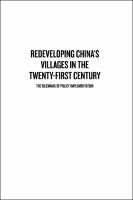Redeveloping China's Villages in the Twenty-First Century
The Dilemmas of Policy Implementation
Abstract
Implementing national policies is a crucial function of the local Chinese bureaucracy and an indispensable part of Beijing's overall state capacity. Yet the specifics of how and why local officials interpret and implement such policies have so far escaped detailed attention. In Redeveloping China’s Villages in the Twenty-First Century, Lior Rosenberg fills this gap by examining the national Village Redevelopment Program, one of China’s most significant policies of recent decades to promote rural change. Based on Rosenberg’s on-site research, Redeveloping China’s Villages in the Twenty-First Century investigates the Village Redevelopment Program’s implementation in both the industrialised county of Chenggu, in Shandong province, and the predominantly agricultural county of Beian, in Anhui province. At the book’s heart is a puzzle: the program was supposed to prioritise poorer villages, but in both Chenggu and Beian—despite being carried out in surprisingly divergent ways—it has subsidised improved infrastructure and services in already industrialised and prosperous villages, while leaving behind poorer ones. In explaining this outcome, Rosenberg elaborates on the larger economic, political and social environment in which Chinese local officials operate, as well as the pressures they face from above. He analyses the dual role played by higher-level authorities, as both policy enablers and thwarters in a system that sanctifies commandism but where the distinction between principals and agents is blurred.
Keywords
China; rural development; rural communities; policy implementation; public administrationDOI
10.22459/RCVTFC.2023ISBN
9781760466022, 9781760466015, 9781760466022Publisher
ANU PressPublisher website
https://press.anu.edu.au/Publication date and place
Canberra, 2024Classification
Rural communities
Public administration


 Download
Download Web Shop
Web Shop